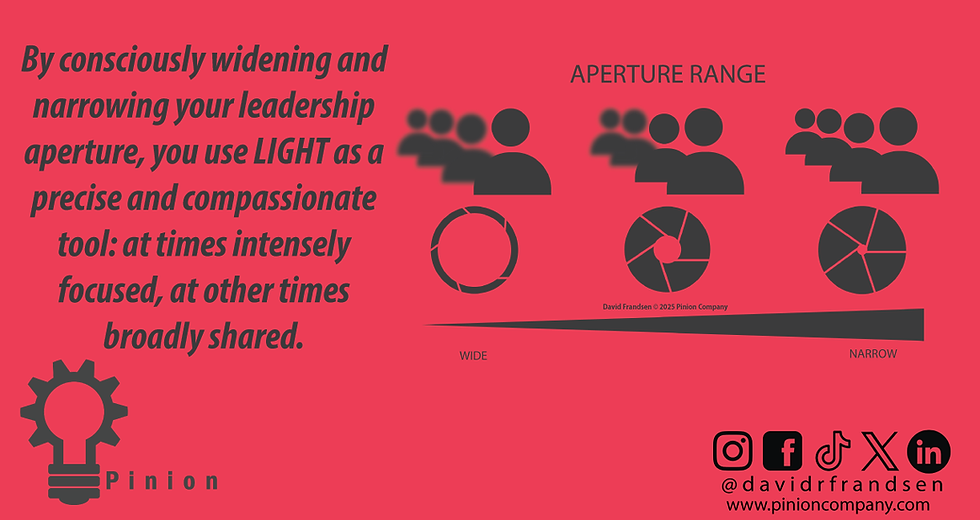The Ranger Effect: Raising Standards and Transforming Organizations
- David Frandsen
- May 20
- 4 min read

Recently on Ryan Hawk’s the Learning Leader Show I heard General Stanley McChrystal talk about the "Ranger Effect". The Ranger Effect is all about setting the highest standards in everything you do and holding yourself, and your team, accountable to those standards. This concept, born in the U.S. Army Rangers, has not only reshaped military culture but has had a profound impact on organizations like ours. It’s a powerful reminder that excellence starts with expectations, and those expectations must be lived every day.
A Legacy of Standards: The Rangers’ Story
During World War II, the U.S. Army Rangers built a reputation for being the best of the best. But after the war, the units were disbanded, and by the end of the Vietnam War, the Army’s standards had slipped badly. Integrity issues, poor discipline, and lackluster training left the Army a shadow of its former self.
That’s when General Creighton Abrams stepped in. In 1973, recognizing the need for a cultural reset, he re-formed two Ranger battalions. His vision was clear: these units would do everything to the highest possible standard. The Abrams Charter spelled it out, the Rangers would be the best units of their kind, period. Their uniforms were sharper, haircuts stricter, discipline tougher. Every detail mattered, and everyone was expected to live up to the standard.
The result? An extraordinary transformation. People in the organization raised their own expectations, and the unit held each other accountable. Serving in the Rangers became demanding-if you put your hands in your pockets, someone would call you out: “We don’t do that.” Over time, these standards spread across the Army. The key difference between the Rangers and everyone else was simply the expectations. By changing their standards, the Rangers didn’t just improve themselves-they influenced the entire Army, and even militaries around the world.
The Draw of Greatness: Why People Want to Be Rangers
What is truly remarkable is how these high standards have become a magnet for people who want to be part of something exceptional. Today, so many people aspire to become Rangers not just because of the prestige or the challenge, but because they want to be held to these incredible standards. There is an undeniable pull to be part of a group where greatness is the expectation, not the exception.
People are naturally drawn to organizations with a reputation for excellence. They want to be surrounded by others who push them to be better, who won’t accept mediocrity, and who take pride in holding each other accountable. The Ranger battalions have become a beacon for those who crave that environment. It’s not just about being tough-it’s about being part of a culture where everyone is striving to be the best version of themselves.
This same effect happens in any organization that sets a high bar. When you create a culture of excellence, you attract people who want to be challenged, who want to grow, and who want to contribute to something bigger than themselves. People want to be a part of greatness.
The Ranger Mentality in Our Organization
This Ranger mentality is not just for the military. I’ve seen firsthand how it works in our own organization. When we have had the highest success, it’s always been because leadership set clear, uncompromising standards and demonstrated them every day. But the real secret? The actual policing of those standards came from everyone-not just the top down, but at every level.
Our managers lead every moment of every day because people are always watching. You set the standard, you raise the bar, and you model the expectations-not just in what you say, but in how you act and interact with people. Leadership’s responsibility is to be the pace car, showing everyone what is expected. But it’s just as important to have the discipline to hold people accountable. Too often, people let standards slip or get shy about calling out issues. The problem is, when you allow this, you are really just setting a new, lower standard.
What I’ve seen is that our greatest successes happen when people at all levels-especially the lowest-set and uphold the highest standards. When the newest member feels empowered to call out someone who isn’t living up to expectations, that is when you know you’ve built a true culture of excellence. It takes courage and consistency, but it’s worth it.
Lessons for Every Organization
The Ranger Effect teaches us some key lessons:
· Set Clear Standards: Make sure everyone knows what’s expected, and don’t compromise.
· Lead by Example: Leaders must model the standards in every action, every day.
· Empower Accountability: Create a culture where everyone-regardless of position-can hold each other to the standard.
Never Lower the Bar: Allowing standards to slip sets a new, lower baseline. It takes courage to maintain high expectations, but that’s what drives real success.
Conclusion: The Power of Expectations
The difference between high-performing teams and everyone else isn’t talent or resources-it’s the expectations they set and the discipline to uphold them. The Ranger Effect shows that when one group commits to being the best, it can inspire an entire organization, or even an entire industry, to follow. In our organization, as in the Rangers, the highest standards aren’t just a goal-they’re a way of life. And that’s how you build a legacy of excellence.




Comments